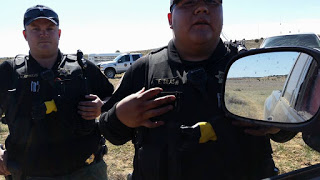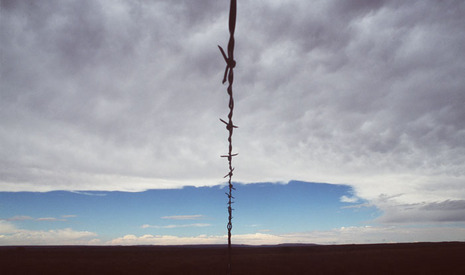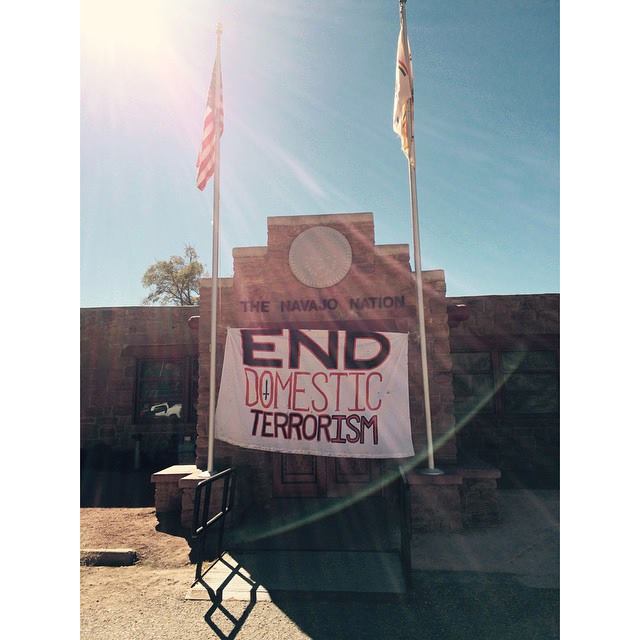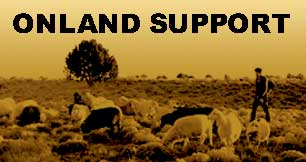Defend Black Mesa Sovereignty. Protect Dine Ways of Life May 14th 2018
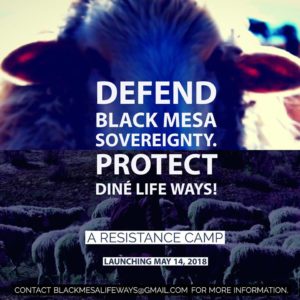
On May 14, 2018, the Diné elders of Black Mesa and Big Mountain are calling resisters from near and far to converge at Black Mesa! On that day, they will launch a continuous camp to defend Diné sovereignty and share traditional ways of life with the younger generation.
Participants will help shear sheep and plant crops, supporting the elders of Black Mesa in continuing their traditional practices. They’ll also have the chance to take part in workshops presented by the elders on skills like wool dying with herbs found on the land, weaving, and natural cooking. Together, they’ll help with work projects like building a corral and chopping wood.
Having a continuous presence at the site will also provide a strong measure of protection against livestock impoundments, a threat the elders face on a daily basis. Participants will therefore take part in talks on land defense and serving as human rights witnesses for the Black Mesa community.
Black Mesa is an area of ancestral Diné territory within so-called Arizona where families have been resisting forced relocation for over forty years. The elders here have steadfastly refused to cede their land to Peabody Coal and wish only to continue their traditional life and allow the land to heal.
BACKGROUND:
The sheep, horses and cattle these families maintain on the so-called Hopi Partitioned Lands (HPL) are their primary means of subsistence and an integral part of their traditional lifeway. Impoundments of livestock are a deliberate violation of the rights of Diné people to practice their traditional culture, continuing a shameful legacy of U.S. government-mandated livestock reductions, as seen during the 1860s and the 1930s.
In recent years, hundreds of sheep, cattle and other livestock have been hauled away in impoundment operations by heavily armed police. Elders in the HPL are presently being threatened with impoundments, resulting in great stress, anxiety and hardship. The community is organizing to prevent future impoundments and is asking for additional support at this time.
The Diné communities of Black Mesa are asserting their sovereign rights to continue to protect and maintain their ancestral grazing lands, cornfields, home sites, and sacred places.
Those who are willing to work, learn, and show respect for the Black Mesa community and land are invited to attend. The elders are strongly encouraging indigenous folks to attend, but non-indigenous people are welcome as long as they’re willing to work. No violence, drugs, or weapons will be tolerated.
GET INVOLVED:
We’re also looking for massage therapists who want to come out and do massage for the elders!
If you’d like to participate, please contact us at BlackMesaLifeWays@gmail.com telling us a little bit about yourself and why you’re interested in taking part! If you’re an indigenous person who would like to request travel support for coming out, please let us know that too.
DONATE!
We’re working to raise funds to make sure we have all the necessary building, planting, and shearing materials for the projects that will be happening at the camp. We need to purchase some shears, planting tools, and construction supplies, for example. Funds will also support travel to the camp for indigenous participants who request support, the camp kitchen, and other infrastructure needs. No matter how large or small, every donation will be deeply appreciated and put to good use!
Donate here:
https://www.youcaring.com/blackmesafamilies-1061777
Thank you so much for your support!
Extreme Drought Conditions on Black Mesa: Support Urgently Requested
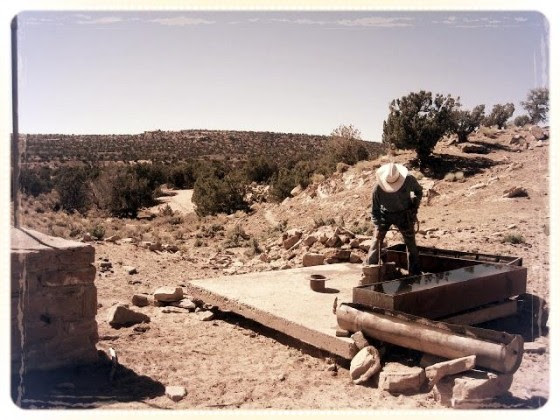
This spring on Black Mesa, the wind is blowing more dust than moisture, which can be typical this time of year. However as a result from the below average monsoon season in 2017 followed by a winter that netted only a few weak storms, the indigenous resistance communities of Black Mesa are facing extreme drought conditions.
According to official weather projections, the long-term dryness is expected to worsen throughout the summer. Regional supplies of water, hay, and feed on the Navajo Nation are already low and shortages can only be expected to persist.
Although the President of the Navajo Nation has declared a drought emergency and has applied for federal funds to assist Navajo farmers and ranchers, families resisting relocation at Black Mesa within the HPL are unlikely to receive any of this aid.
At this time, Diné families resisting relocation at Black Mesa are issuing an urgent international call for support. Supplemental resources such as water, hay and nutritional support will need to be delivered in order to sustain the herds of sheep and other livestock that families depend on. On the ground assistance from volunteers with sheepherding and sheep shearing experience is also needed, to help maintain the herds of the community.
Diné residents at Black Mesa are currently organizing to support the elders of their community. Local Diné people skilled in sheep shearing will be traveling between households that are requesting shearing assistance. Other volunteers and community members will be collaborating to purchase and distribute essential supplies for livestock including hay and nutritional support for lambs and expectant ewes. There will also be an ongoing need to haul and deliver drinking water to elders living in remote areas. As hotter summer temperatures set in, there will be a continual need for assistance with water and supply delivery. Donations are urgently needed to make these essential efforts possible.
Due in part to the impacts of Peabody Energy’s massive coal operations at Black Mesa, the indigenous communities of the area suffer from perpetual water scarcity and are forced to haul water over great distances for household and livestock needs. Meanwhile, the energy extracted from Black Mesa mining has, for decades, powered key water-delivery infrastructure for Phoenix and other metropolitan areas through the Central Arizona Project. Epidemic drought conditions can only be expected to worsen in coming years, as fossil-fuel induced climate change continues unchecked, driving up global temperatures and accelerating a trend of precipitation loss in the southwest.
What can you do?
- Donate funds to sustain on-land assistance efforts at Black Mesa that seek to ensure the well-being of elders and the ancestral sheep herds. Funds are needed to cover the cost of gas money and supplies.https://supportblackmesa.org/donate/ Specify: BMIS-Dineh Drought Relief Fund
- Come to the land and stay with a family at Black Mesa. Come prepared to herd sheep and work under the direction of Diné matriarchs. https://supportblackmesa.org/take_action/
- Find ways to lend your support to Diné people and organizations that are working to shut down the Kayenta Mine and Navajo Generating Station forever. Support Diné and other indigenous organizing against fracking and other extractive energy projects.
Laura Flanders Show Special Report on Mining and Resistance on Black Mesa
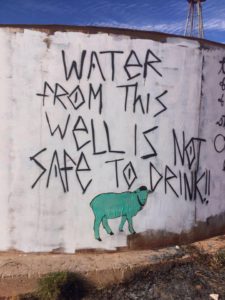
http://www.lauraflanders.com/?video=TiZ7pPNISyc
Call for Support: Volunteers Requested for Sheepherdering and Human Rights Observing
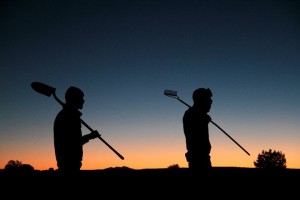
Ongoing support in the form of volunteer sheepherders and human rights observers are requested on Black Mesa.
So many families within in the communities on Black Mesa have opened their homes to countless supporters over the years,creating an opportunity to engage in true support and solidarity. Families have said that supporters have played a helpful part in their on-going resistance against relocation in many ways- facilitating a sense of global awareness of the laws affecting them, providing temporary back-up for the extended family, and creating a human to human connection that acknowledges a people’s right to exist and
thrive in their own homeland.
The families who have opened their homes and hearts to supporters over the years have given so much to the people who have visited them. This I know personally as I myself have been a returning supporter for 20 years. I have seen how strong the families in this community are, and how important it is for them to exercise their right to determine whom they shall invite into their homes as their guests. This right is at risk under the Hopi Ordinance 46, which declares that each Dineh family living on the “Hopi- Partitioned Lands” are required to gain permission from the Hopi Tribe for their own invited guests.
Not only is this an insult to a person’s sovereignty, it is a denial of a person’s right to humanitarian aid. Just last week a notice of Trespass was left at a homesite stating that any non-Hopi without permission to be there must leave immediately or face removal or arrest. This threat is not just meant for supporters, but also can apply to any Dineh resident who has refused to comply with obtaining permission from the Hopi Tribal Council to live in their own home and take care of their own livestock. The enforcement of this law, the impoundments and other forms of harassment are a result of a recent estimated 90 million dollars from the Department of the Interior to “finish the relocation.”
The relocation laws have strangled the community’s economic viability by denying the younger generations a right to reside with their parents and grandparents. The repartitioning of the land has left many families within a gap of services that provide essential human needs. The friends and connection of the support network has provided a small but kind and useful service that has been valued for decades.
When Clarence and Mary Lou Blackrock took me into their home and let me help by herding their sheep, my connection to “the struggle” became personal, and I have listened to the requests of the other residents to continue to bring support in. This is why I am writing this call to the support network. BMIS has seen a steady decline in the amount of supporters coming to stay with families. We are asking you to honor the connections you have made with the families and return. We are asking you to be a supporter of a community that is still strong and standing after decades of unjust laws. We are asking you to engage in a people’s sovereign right to their own relationships. We are amplifying their demand to stop the violations of their human rights.
If you are able to come and be a human rights observer and sheep herder for the Blackrocks or any of the other families who are on the frontlines resisting resource colonialism please email us at blackmeasis@gmail.com.
Sincerely,
Tree, on behalf of the Black Mesa Indigenous Support, the Blackrock family, and other families of Black Mesa
“Big Mountain is Under Siege Again”–Louise Benally on Livestock Impoundments
“We are asking you to take action. Big Mountain is under siege again because Peabody Coal is losing its income from coal mining, so it is pressuring the tribal government to attack its own people. We’ve been opposed to the mining since 1974 when PL 93-531 was passed. Now with the coal companies collapsing they are trying to take the only resource we have, which is our animals to eat and sell.
They are stealing our livelihood away and holding them in pens and charging us a lot of money and refusing to bring them back to people’s homes. When the animals are taken away, people can’t return to their homes.
They are holding the animals as ransom, but we don’t have money because we don’t have a cash economy. There is no work except for the coal mine. We need human rights and justice for the environment. This is a fight for human rights — Animals are food. When they take our food what choice to we have? We are calling out to the world to help us apply public pressure. Demand animals be returned to owners and that the owners are allowed to decide how to manage the land and animals.
Call the Department of the Interior, the Department of Justice, and the Navajo Nation. The Navajo Nation refuses to help the people who are resisting relocation openly. No one is backing us up because we are resisters. This has always been stacked against us.
They are harassing and terrorizing people and when they take their animals away they can never come back to the land. They tell us we are illegally living here. We are illegal aliens basically. But I am older than PL 93-531. I was born in 1960 and that law didn’t come along until 1974. That’s why I don’t recognize it. I was here before.”—Louise Benally, Dineh, Big Mountain LouiseBenally6@gmail.com
Numbers to Call:
BIA superintendent Wendel Honanie at( 928-738-2228),
Hopi Rangers Clayton Honyumptewa at (928-734-3601),
Navajo Nation President Russell Begaye: (928) 871-6352/6353
Department of Interior at (602-379-6600)
You can donate to a livestock impoundment fund HERE. Please specify “Black Mesa Impoundements” in the designation box.
If you can come out to the land and act as a human rights observer in the face of this increased community harassment, contact blackmesais@gmail.com
Elder Matriarch Relocation Resister, Ida Mae Clinton, Passes on to the Spirit World
With great sadness and respect for a powerful life, we share that Elder Matriarch relocation resister, Ida Mae Clinton, of Star Mountain, has passed onto the spirit world. With the permission of her family, we share this video–made by NaBahe Katenay Keedihiihii this spring–in memory of Ida Mae’s life. Her family sends appreciation to all who have come out to support Ida Mae over the years. May she rest in power.
Requesting immediate Support for Dineh Resistance Communities whose livestock are being impounded by Hopi Rangers and Federal Agents.
Below is the letter that the community members impacted by impoundments delivered today at the Navajo Nation Council Chambers in Window Rock:
Requesting immediate Support for so-called “Hopi Partition Land ( HPL)” residents whose livestock are being impounded by Hopi Rangers and Federal Agents.
The Hopi rangers and Federal agents used military tactic operation to conduct livestock impoundment.
We [the undersigned] Dine’ families who have resided for generations on the area now known as Hopi Partition Land (HPL) are asking for the full protection of the Navajo Nation Executive, Legislative, and Judicial branches, based on the ongoing threat of the pre-dawn raids from heavily armed federal authorities. Currently Hopi Rangers, Federal Special Weapons and Tactics Teams (SWAT) are using paramilitary tactics against unarmed elders and Dine’ citizens. Community members live in fear due to S.W.A.T. teams fully dressed in paramilitary gear including flack jackets and assault rifles. There are also drones and helicopters hovering over their homesteads, it is like a war zone.
We believe this is a direct violation of constitutional and internationally recognized human rights. Based on our fundamental right of free prior and informed consent of the United Nation Declaration on the Rights of Indigenous people. (UNDRIP). There was no fair notification and no due process. Families have experienced forced false imprisonment, being held at gun point, illegal entrance of homes and illegal searches without warrants or permission, and extreme intimidation tactics. Road blocks have been put up by Hopi Rangers & BIA police which disrupted healing ceremonies not allowing family members to conclude ceremonies, which is a violation of our freedom of religion. These egregious actions has caused severe damage to the elders’ health and wellbeing and may very well injure them irreparably.
We, [the undersigned] Dine’ of Big Mountain demand the Navajo Nation government and its departments and appropriate entities to commit to the protection and representation of the families affected by the livestock round ups. The Navajo Nation must provide legal representation for all families impacted by round-ups, inspections, and detentions. Also critical is the need to provide proper interpreters for non english speakers. We also demand the Navajo Nation elected officials, president, Speaker of the council, and council delegates to immediately convene a special session on the impacted lands of Big Mountain, Cactus Valley, Tseyatoh, Mosquito Springs, Wide Ruins, Red lake, Jadeite, Low Mountain, White Cone and Teesto, to sponsor and support a meeting with the Hopi government representation, Chairman, Hopi Rangers and Hopi Law enforcement and impacted families to meet with HPL community members to create a more positive non- threatening relationship [for inspections and tally counts]. Lastly to assist ALL impacted families with appropriate legal representation for violation of their rights, illegal detention of their livestock and families. We demand a Navajo lawyer that can talk without translation to ensure integrity of representation.
We believe this assault on our lives and theft of our only sustenance and livelihood is being funded and instigated by the federal government through the Department of Interior and Bureau of Indian Affairs, through their continued campaign to gain access to the resources on our ancestral homelands by forcing us off the land. Our sovereignty is under threat and our human rights have been and continue to be violated through these well know colonialist tactics. Dine’ people along with all Indigenous people have suffered for too many generations. But, we have always resisted and continue to this day. This is an opportunity to stand with us as we uphold our responsibilities to the land, our way of life and our ancestors.
Sheep Emergency Fund: for Black Mesa families targeted by unjust livestock impoundments
All funds raised will go directly to Dineh families on the Black Mesa ‘HPL’ lands who have been aggressively targeted with livestock impoundments starting on October 22, 2014. Click here for donation page
 So far, three Black Mesa families have had their entire herds of sheep & goats impounded and are facing fees totaling about $1,000 per family to secure the release of their livestock. More impoundments appear to be imminent.
So far, three Black Mesa families have had their entire herds of sheep & goats impounded and are facing fees totaling about $1,000 per family to secure the release of their livestock. More impoundments appear to be imminent.
This is an emergency fund that will go directly to covering fees and costs faced by the targeted families. Funds are being collected and distributed by Black Mesa Indigenous Support (BMIS), with the guidance of Black Mesa residents. BMIS will make records available detailing how funds were distributed.
“They way that the rangers are treating the people goes against the Dineh way; it is very taboo to point a gun at somebody. They are traumatizing an already traumatized community. If overgrazing was actually the issue they could just educate people. But it’s not. This is uncalled for.”–Marie Gladue 10/26/14
“I disapprove of the impoundments. They really affect the elderly. Ever since I was a baby I was carried on a horse to herd sheep. I have herded all my life and I am in my eighties. You have the livestock in your heart, and they want to take that away.”–Jack Woody, Black Mesa Elder, 10/25/14
“Our life is connected to the life of the sheep. We are alive and strong because of them, and being close to them, being with them everyday, keeps us strong. Especially now in our old age the sheep are important to us. If we are too far from our sheep, we can become frail. “ –Clarence and Mary Lou Blackrock 10/25/14
for more information:
https://supportblackmesa.org/
http://www.indigenousaction.org/statement-on-recent-aggressive-confiscation-of-dineh-resisters-sheep-herds-by-nabahe-katenay-keedihiihii/
https://supportblackmesa.org/2014/10/urgent-widespread-impoundments-an-arrest-on-the-hpl-october-2014/
